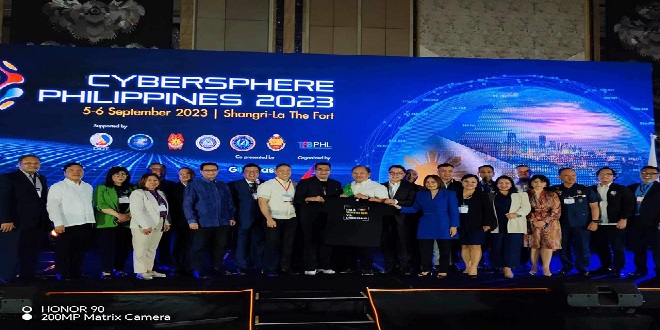
In 2020, the COVID-19 pandemic accelerated the digitalization of the Philippines, and even after two years, the process of digital transformation continues. This shift has created new opportunities for showcasing and developing digital and tech products and services. However, it has also given rise to heightened concerns about cybersecurity.

With a projected 85 million Filipinos using the internet in 2022, the average daily internet usage has reached 11 hours per person. Social media usage in the Philippines is estimated at 93 million, while e-wallet usage has reached 58 million users. According to the National Statistics Authority, the annual spending by Filipinos on online product purchases surged to $17.9 billion in 2022, contributing to a digital economy valued at 2.08 trillion pesos or 9.4% of GDP. The Philippines has undoubtedly transformed into a digital nation.
Yet, this digitalization has also brought unforeseen consequences, most notably a surge in cybercrime, particularly cyber fraud. Frost & Sullivan reported an expected economic loss of $3.5 billion from cyberattacks in 2018.
In response, the private sector is investing heavily in cutting-edge cybersecurity to safeguard their digital infrastructure. Many organizations in the digital industry have engaged in forums and collaborations with government agencies to address the critical cybersecurity policy and skills gap at the macro level.
However, the micro-level challenge of addressing the cybersecurity knowledge gap has been overlooked. The true extent of cyber fraud victimization among Filipinos remains uncertain because many victims do not report these incidents or are unsure where to report them.
Due to a lack of digital literacy and a mindset focused on internet speed rather than security, there is a dearth of a strong cybersecurity culture at the grassroots level in the Philippines. Recognizing this gap, Truth360, a startup specializing in reputation management and advocacy marketing, established Scam Watch Pilipinas.
Scam Watch Pilipinas is a nationwide cybersecurity movement co-founded by Jocel De Guzman. Its mission is to educate Filipinos and instill a cybersecurity culture in every household, particularly in defense against cyber fraud. The vision is to unite companies, government entities, various sectors, and the public to create a community of vigilant individuals in key cities and towns across the country.
Scam Watch Pilipinas addressed the unintended consequences of digitalization, specifically cyber fraud and online scams, at the Cybersphere Philippines 2023 event held in Manila on September 5 and 6, 2023. This forum aimed to empower and educate Filipinos through a collaborative effort involving companies, brands, various sectors, and key government agencies. The event was hosted by the Department of Information and Communications Technology (DICT).
Cybersphere Philippines 2023 brought together cybersecurity experts, professionals, and enthusiasts to discuss the latest advancements, challenges, and solutions in the field.
In his keynote address, De Guzman urged Filipinos to report cyber fraud incidents to the Inter-Agency Response Center (I-ARC) by calling Hotline 1326 and utilizing other government reporting channels. He emphasized the need to build a vigilant multi-sectoral community under Scam Watch Pilipinas to serve as the national citizen arm in combating cyber fraud.
Scam Watch Pilipinas aims to develop and propose digital literacy and cyber hygiene curricula for elementary and high school students to prevent future generations from falling victim to cyber fraud. De Guzman mentioned partnerships with the Journalism Studies Association of the Philippines and academia to create such modules.
In an interview, De Guzman highlighted that a lack of digital literacy and cyber hygiene creates opportunities for fraudsters and scammers. To address these concerns, Scam Watch Pilipinas launched the “Kontra Scam Attitude,” encouraging Filipinos to practice safe internet habits, which includes four key steps: “Mag-damot. Mag-duda. Mang-isnab. Mag-sumbong.”
De Guzman expressed gratitude to Department of Information and Communications Technology (DICT) Secretary Ivan Uy and Cybercrime Investigation and Coordinating Center (CICC) Executive Director Usec. Alexander Ramos for their support and collaboration in the mission to protect Filipinos against cyber fraud.
For more information, please follow Scam Watch Pilipinas on Facebook.







